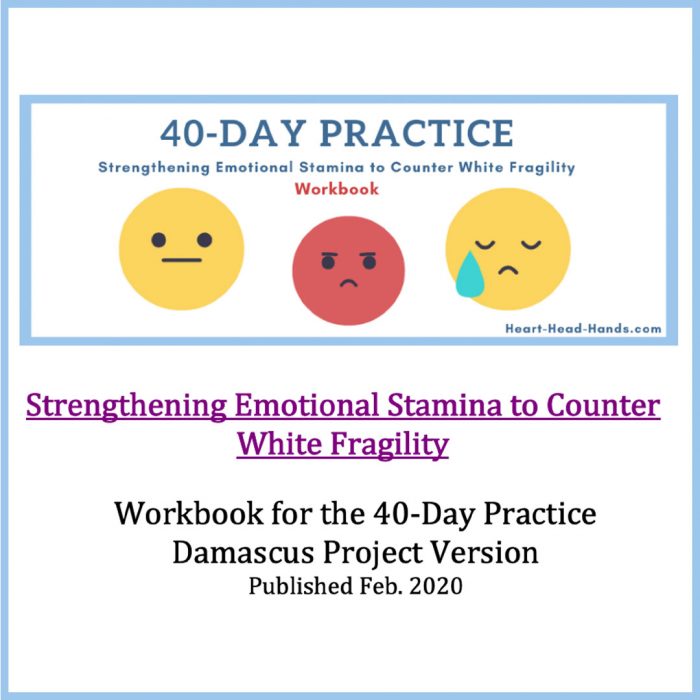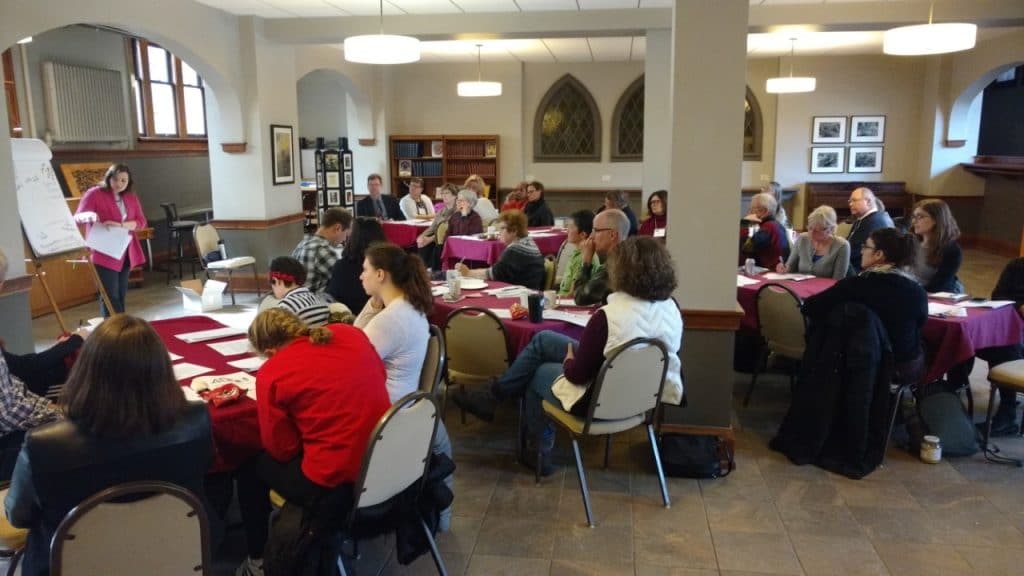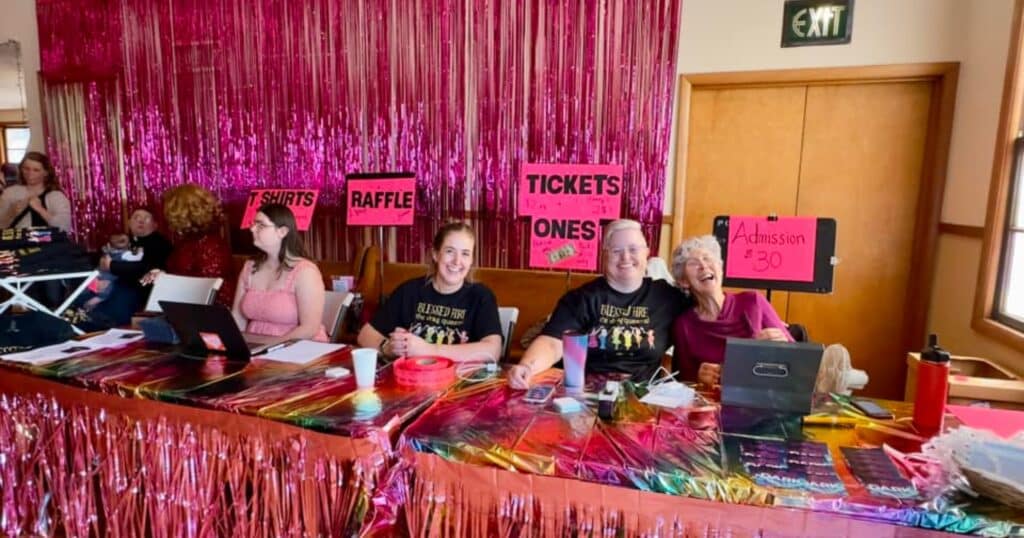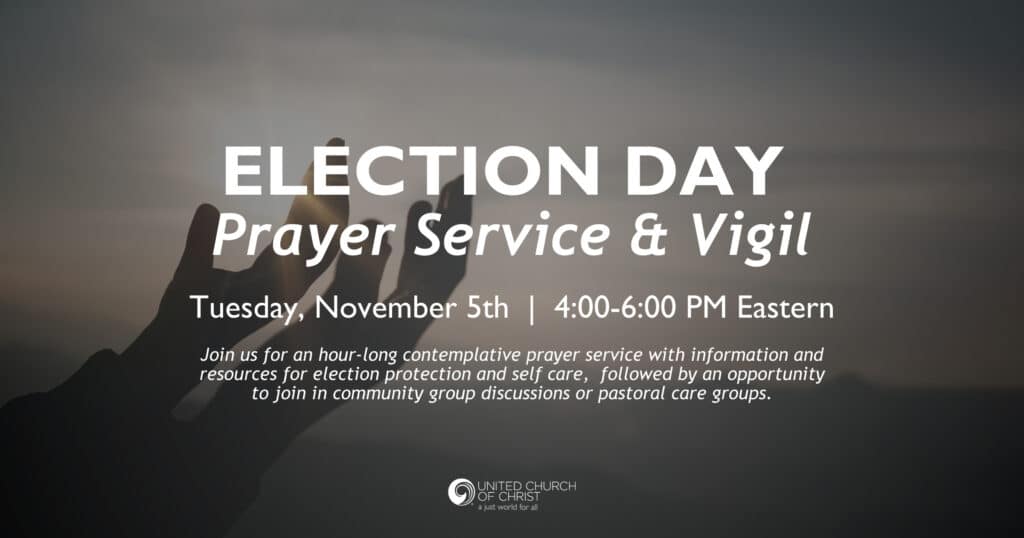40-day anti-racism practice helps participants ‘unlearn’ during Lent
What did you give up for Lent?
That’s a question often posed by Christians who see Lent as a season of sacrifice and self-reflection. A time of preparation for the hope and joy that Easter brings.
But this year, hundreds of members of the United Church of Christ might instead be asking each other, “What did you unlearn?”

Those people, more than 230 of them primarily across the Wisconsin and Minnesota Conferences, took part in a 40-day anti-racism practice, “Strengthening Emotional Stamina to Counter White Fragility.” Offered though the Conferences’ joint leadership development program, the Damascus Project, the online course asked participants to take a journey of self-work to unlearn internalized white supremacy.
‘Unlearning the luxury of not noticing’
“In light of the murder of George Floyd, we felt a learning opportunity around white fragility and emotional stamina would be timely,” said the Rev. Tisha Brown, Wisconsin Conference associate Conference minister for leadership development. “The original practice Beth developed is a 40-day practice. Lent was a logical fit.”
Beth Godbee is an educator and former college professor who believes “we can’t just think our way out of incredible injustices … we must feel and act too.” The founder of Heart-Heads-Hands is the developer and facilitator of the practice. She designed it to help people better understand the white supremacist culture in the United States and to counter white people’s internalized acceptance of that social environment.
“That’s why it’s framed as a mindfulness practice, becoming aware of the ways in which we are living in a white supremacist culture,” said the Rev. Abby Henderson, Minnesota Conference director of leadership development. She said white supremacy is not just the Ku Klux Klan or blatant examples we see in society. “White supremacy is internalized. That’s where the unlearning comes in. White supremacy is sinister, pervasive and subtle. For people who live whiteness every day, it is much harder to notice the ways it shows up everywhere. That’s the unlearning. One unlearns the luxury of not noticing.”
Meditating, reading, journaling

Henderson and Brown, co-directors of the Damascus Project, were heartened by the number of people who signed up to “unlearn.” They were UCC members, with few exceptions, from other states – California, Colorado, Illinois, Maine and New York – in addition to the main cluster from Indiana, Minnesota and Wisconsin. They also noted that 18 congregations signed up groups of people.
The practice involved daily self instruction – meditating, reading, journaling – all focused on recognizing “white fragility,” or the discomfort and defensiveness that white people feel when confronted with racial injustice. As Godbee notes, 40 days has spiritual significance, as many traditions used it to mark transformation. That period can also be linked to forming habits and developing contemplative practices.
“I’ve been participating in the course, so I can share what I feel like I’m learning,” Brown said. “I’m learning how judgmental I am toward myself. The guilt and shame that shows up … it stops me from being able to feel the reality of the system. We are all diminished by it. Unlearning means meeting that personal guilt and shame with kindness and compassion. We are drawn into the system and structures (of whiteness), so extending self compassion is the first place to start. We don’t have to beat ourselves up.”
“It’s also about building our tolerance for discomfort,” Henderson said. “When we feel hurt or discomfort or awkwardness in a situation, encountering conflict around racism, we often just want to withdraw. We are learning to stay in the moment. Extend the grace to ourselves to build up the muscle and stick it out, by rewiring our pathways in our mind and souls to engage in the tough conversations.”
Connecting with others
Participants are doing that through daily guided meditation, journaling and interacting with others through an activity feed. There’s a workbook that includes resource guides and four weekly sessions, where all can gather on Zoom. There’s also a conversation guide for use within local churches.

It’s a counterintuitive approach, an invitation to feeling; instead of let’s read a book to discuss, Brown said, which takes some getting used to.
“The practice asks you to tune into what goes on in your body to when you see racism. To understand what that data is giving you, and to feel what the best intervention should be in that moment,” Henderson said.
“My personal feeling is that this course is offering an important element of racial justice work that is often overlooked,” Brown said, “the work of white people dealing primarily with one another around racial trauma and how it manifests itself in our bodies, our lives and in how we express our privilege.”
‘Discomforts lead to transformations’
The curriculum, the written instruction and the research all outline strategies for navigating difficult moments, but also ask participants to integrate the added information from their bodies and their emotions – one’s own anxiety and reactivity.
The Rev. Lori Bievenour, pastor of St. Peter’s United Church of Christ in Carmel, Ind., is enthusiastic about the practice. She and 40 members of her congregation signed up. Many of them also took part in the church’s internal “Anti-Racism 101” course last fall.
While she said that there was some initial anxiety about learning the online platform and the self-direction of the work, Bievenour said she was heartened that 40 of them “were making an effort to dig a little deeper, and listen a bit more intently. … Sometimes our biggest discomforts lead to our biggest transformations.”
The pastor also said her favorite part of the course has been “learning how important the body practices are. I am also learning how important it is for me to be in conversation with others.”
‘Embodied awareness’
The Rev. Andrew Warner, former pastor of Plymouth Church UCC, in Milwaukee, said he and about 60 in his congregation worked through the course with Godbee in 2018.

“One reason that I wanted to work with Beth was her approach of moving anti-racist work from our heads and into our bodies and hearts,” Warner said. “I valued her attention to emotional literacies — which she named as ‘embodied awareness, knowledge, response-abilities.’ Beth’s work built on and complemented work we’d done using the UCC’s White Privilege curriculum.
“I felt the program moved our congregation forward, which is why I recommended it to Tisha. I particularly appreciated Beth’s attention to our emotional selves in this work — especially important given the way implicit bias affects so many racially charged moments.”
Since Plymouth Church took part pre-pandemic, the church group was able to meet in person. But Warner, now a generosity officer in the UCC’s national ministries, thought the practice could adapt well to the virtual learning space and would work well for the reflective nature of Lent.
‘Learning the lean-in instinct’
The course officially came to an end on March 31, and Henderson said she hopes that each participant has tapped into their own awareness of their reactivity around race, to increase tolerance for growth. “The practice really invites that looking inward. That’s why it’s so appropriate for Lent. Learn more about what shuts me down, and what will it take to keep me open.”
“Unlearning the withdrawal instinct,” Brown said, “and learning the lean-in instinct. The focus is on love, compassion and kindness, instead of ‘pointy places.’ I’m unlearning the pointy edges of being white, where I get judgmental and sink down.”
“If I could tell others just one thing, it would be that we have to unlearn how we learn,” Bievenour said. “A course like this gives you way more material than you can every get through, with way more hours of engagement than anyone should be able to fit into their schedules, with way more personal, spiritual soul work woven into the ‘assignments’ than any one person or congregation could complete. This is OK, and in fact, it’s probably good.
“We need to find our own paths through these challenging realities, and an experience like this really has stretched other participants from our congregation and me in ways that are uncomfortable but oh-so-necessary.”
Related News
‘Blessed Are the Drag Queens’: Oregon church event celebrates love and acceptance
Amid harmful anti-trans and nonbinary legislation and political messaging, Bridgeport United...
Read MoreUCC to offer Election Day Prayer Service and Vigil
On Election Day, Nov. 5, join the Rev. Karen Georgia A. Thompson together with United Church...
Read MoreGoing beyond the blessing: Churches emulate St. Francis’ care for animals
https://www.youtube.com/watch?v=lu3LYwhLxCo UCC News presents a video news story on the...
Read More


